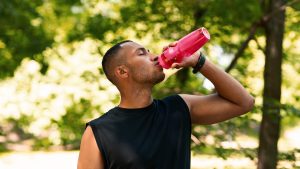As the summer sun blazes across the country, residents and visitors alike are reminded of the critical importance of staying hydrated. With temperatures soaring and humidity levels high, the risk of dehydration becomes a significant health concern. Proper hydration is not just a matter of comfort but a vital necessity to maintain health and well-being during the hot summer months.
The hot climate presents a challenging environment where dehydration can quickly set in, especially for those who spend a lot of time outdoors. Whether spending time at the beach, enjoying a theme park, or simply running errands, the intense heat can lead to rapid fluid loss through sweat. Dehydration occurs when the body loses more fluids than it takes in, and in Florida’s summer heat, this can happen faster than one might expect.
Dehydration can have serious health implications. Mild dehydration can cause symptoms such as dry mouth, headache, and fatigue. More severe cases can lead to dizziness, confusion, rapid heartbeat, and even heat stroke—a medical emergency that requires immediate attention. Children, the elderly, and individuals with chronic illnesses are particularly vulnerable to the effects of dehydration.
The body relies on water to perform critical functions, including regulating temperature, maintaining joint lubrication, and facilitating digestion. During hot weather, the body works harder to cool itself through sweating, increasing the need for water. Failing to replenish this lost fluid can disrupt these essential processes, leading to a range of health issues.
Need some tips for staying hydrated? Here are few simple ones.

The heat and humidity of summertime increase the need for proper hydration, especially when outside. (Adobe Stock photo)
The most straightforward way to stay hydrated is by drinking water throughout the day. Carry a water bottle with you and make a habit of sipping regularly, even if the feeling of thirst is not strong. Thirst is a late indicator of dehydration, so proactive drinking is crucial.
Incorporate water-rich foods into your diet. Fruits and vegetables such as watermelon, cucumbers, oranges, and strawberries have high water content and can help keep you hydrated. They are also healthy choices that are rich in nutrients that can support overall health.
Both alcohol and caffeinated drinks can contribute to dehydration. While it is okay to enjoy these in moderation, be sure to offset them with extra water intake.
Urine color is an easy way to gauge overall hydration level. Light yellow or clear urine generally indicates proper hydration, while darker urine suggests that more fluids are needed for proper hydration.
Whenever possible, seek shade or air-conditioned environments during the hottest parts of the day. Wearing light, breathable clothing and a hat can also help reduce the risk of overheating and fluid loss.
Public parks, beaches, and recreational areas often have water fountains and hydration stations. Local health departments and organizations frequently run awareness campaigns and provide resources to educate the public about the importance of hydration.
Emergency services also stand ready to respond to heat-related health issues. Citizens are encouraged to look out for one another, especially vulnerable populations, ensuring that everyone has access to the necessary resources to stay hydrated.
As summer continues to heat up, the message is clear: staying hydrated is essential for enjoying all that Florida has to offer. By taking simple but effective steps to maintain proper hydration, residents and visitors can protect their health and fully embrace the sunny, vibrant Florida summer.
An Equal Opportunity Institution.
- Plugging Spending Leaks - October 24, 2025
- Pets are Good for Mental Health - September 26, 2025
- Develop a Family Emergency Plan for Hurricane Season - June 30, 2025
